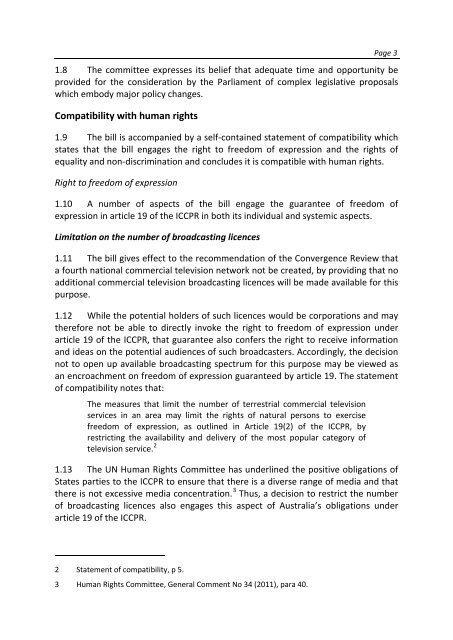Parliamentary Joint Committee on Human Rights
Parliamentary Joint Committee on Human Rights
Parliamentary Joint Committee on Human Rights
Create successful ePaper yourself
Turn your PDF publications into a flip-book with our unique Google optimized e-Paper software.
Page 3<br />
1.8 The committee expresses its belief that adequate time and opportunity be<br />
provided for the c<strong>on</strong>siderati<strong>on</strong> by the Parliament of complex legislative proposals<br />
which embody major policy changes.<br />
Compatibility with human rights<br />
1.9 The bill is accompanied by a self-c<strong>on</strong>tained statement of compatibility which<br />
states that the bill engages the right to freedom of expressi<strong>on</strong> and the rights of<br />
equality and n<strong>on</strong>-discriminati<strong>on</strong> and c<strong>on</strong>cludes it is compatible with human rights.<br />
Right to freedom of expressi<strong>on</strong><br />
1.10 A number of aspects of the bill engage the guarantee of freedom of<br />
expressi<strong>on</strong> in article 19 of the ICCPR in both its individual and systemic aspects.<br />
Limitati<strong>on</strong> <strong>on</strong> the number of broadcasting licences<br />
1.11 The bill gives effect to the recommendati<strong>on</strong> of the C<strong>on</strong>vergence Review that<br />
a fourth nati<strong>on</strong>al commercial televisi<strong>on</strong> network not be created, by providing that no<br />
additi<strong>on</strong>al commercial televisi<strong>on</strong> broadcasting licences will be made available for this<br />
purpose.<br />
1.12 While the potential holders of such licences would be corporati<strong>on</strong>s and may<br />
therefore not be able to directly invoke the right to freedom of expressi<strong>on</strong> under<br />
article 19 of the ICCPR, that guarantee also c<strong>on</strong>fers the right to receive informati<strong>on</strong><br />
and ideas <strong>on</strong> the potential audiences of such broadcasters. Accordingly, the decisi<strong>on</strong><br />
not to open up available broadcasting spectrum for this purpose may be viewed as<br />
an encroachment <strong>on</strong> freedom of expressi<strong>on</strong> guaranteed by article 19. The statement<br />
of compatibility notes that:<br />
The measures that limit the number of terrestrial commercial televisi<strong>on</strong><br />
services in an area may limit the rights of natural pers<strong>on</strong>s to exercise<br />
freedom of expressi<strong>on</strong>, as outlined in Article 19(2) of the ICCPR, by<br />
restricting the availability and delivery of the most popular category of<br />
televisi<strong>on</strong> service. 2<br />
1.13 The UN <strong>Human</strong> <strong>Rights</strong> <str<strong>on</strong>g>Committee</str<strong>on</strong>g> has underlined the positive obligati<strong>on</strong>s of<br />
States parties to the ICCPR to ensure that there is a diverse range of media and that<br />
there is not excessive media c<strong>on</strong>centrati<strong>on</strong>. 3 Thus, a decisi<strong>on</strong> to restrict the number<br />
of broadcasting licences also engages this aspect of Australia’s obligati<strong>on</strong>s under<br />
article 19 of the ICCPR.<br />
2 Statement of compatibility, p 5.<br />
3 <strong>Human</strong> <strong>Rights</strong> <str<strong>on</strong>g>Committee</str<strong>on</strong>g>, General Comment No 34 (2011), para 40.


